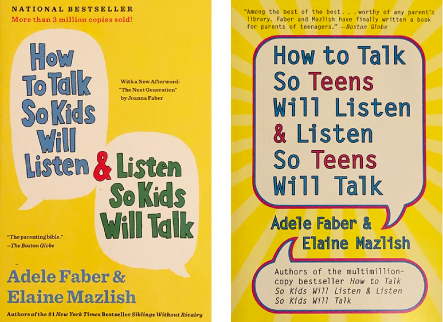EXPERIENCE
PARENT’S WORKSHOP
Parent’s Workshop
What is it all about?
One of the greatest gifts parents and children can give each other is attention, time, respect, listening, speaking and sharing.
EARTHSHOPS Parents Workshops are designed to listen to frustrations and successes, to share the attitudes behind best selling authors Adele Faber and Elaine Mazlish book, “How To Talk So Kids Will Listen & Listen So Kids Will Talk.”
Whether we’re frustrated by our four-year-old, or nervous about our 14-year-old, the results experienced practicing these workshops skills – right from the first session – motivate us to work towards their mastery!
How To Talk/Listen tools are embraced and folded into EARTHSHOPS philosophy.
These inspiring tools of the two loved around the world authors Adele Faber & Elaine Mazlish, and their teacher Dr. Haim Ginnot, have been chosen by the university of Wisconsin, to train and establishing peaceful ways of communication in families, schools, and work places.
“I feel fortunate to be able to share my 20 years of experience practicing these skills, to empower you to be the caregiver that you want to be. Peacful communication is a key to harmony.”

What we will explore in this workshop?
Listening so you actually hear what your children are saying.
Speaking so your kids hear you.
Developing a communication style that honours everyone.
Workshop duration
7 weekly sessions that take anywhere from 1.5 to 3 hours
Individual/group follow up available to workshop participants

TOPICS INCLUDE:
Helping Children Deal With Their Feelings
Specific skills adults can use to help children recognize and cope with their negative feelings: disappointment, envy, frustration, resentment, anger, etc. Ways to accept children’s feelings, limit unacceptable behaviour, and still maintain goodwill.
Engaging Co-operation
How children react to commonly used methods to get them to co-operate: threats, warnings, orders, name-calling, sarcasm, lecturing, etc. Five ways to invite co-operation that will leave parents and children feeling good about themselves and each other.
Alternatives to Punishment
How do children normally react to punishment? Is it necessary to rely on punishment as a means of discipline? What is the difference between “punishment” and “natural consequences?” Some alternatives to punishment that enable adults to express their strong disapproval without hurting or alienating as well as encourage children to assume responsibility for their behaviour.
Encouraging Autonomy
Ways to help children become separate, responsible people who can one day function on their own. Specific skills that help children to become more self-reliant.
Praise
What kinds of praise build a positive and realistic self-image, and what kinds are counter-productive? Ways to help children become aware of their strengths so that they can put them into action.
Freeing Children from Playing Roles
A look at how children are sometimes cast into roles (bully, whiner, dawdler, mischief-maker, etc.) and how we can free them from playing out these roles.
*Certificates of completion will be awarded to attendees at the conclusion of the program.

…”The beginning of wisdom is listening… to hear the feelings that the words try to convey, to hear what children are feeling and experiencing, to hear their point of view and thus understand the essence of their communication. Parents need an open mind and an open heart, which will help them to listen to all kind of truths, be they pleasant or unpleasant. But many parents are afraid of listening because they may not like what they hear. Unless parents create a climate of trust that encourages their children to share even their disturbing feelings, opinions, complaints, and ideas, children will not be truthful. They will only tell their parents what they want to hear.”


“It was such a positive experience to participate in. This workshop has really helped me recognize how to be aware of my own behaviour, but also recognize that there are different ways to speak to children – different skills to try to solve a problem. The best thing about the workshop is realizing how important it is to acknowledge the feelings of my children – be it positive or negative. It really is the key.”
Jela B. Toronto 2019
How can parents create a climate of trust?
By the way they respond to unpleasant truths.
Let's see how it works.
The following are a few examples of not helpful parental comments:
“What a crazy idea” (dismissing)
“You know you don’t hate me” (denying)
“You’re always going off half-cocked” (criticizing)
“What makes you think you’re so great?” (humiliating)
“I don’t want to hear another word about it!” (getting angry)
Acknowledging is not agreeing. It's only a respectful way of opening a dialogue, by taking children's statements seriously.
Instead of:
Denying the child’s perceptions
Disputing the child’s feelings
Disowning the child’s wishes
Deriding the child’s taste
Denigrating the child’s opinions
Derogating the child’s character
Arguing with the child’s experience
Simply, acknowledge.
Example...
One little girl told her mother:
“Mommy, I’m so tired of all your bossiness!”
The solution...
When possible, consider acknowledging the child’s feelings and offering a choice:
”Oh, so you don’t like being told what to do, do you? Well, let me say it in another way: no ball playing in the living room, but let’s think about where you can play. Hmm… Outdoors in front of the house?… Or maybe in the backyard? Whichever you prefer. You decide.”
– From the book “Between Parent and Child” by Dr. Haim G. Ginott The mentor of the authers Adele Faber & Eilane Mazlish

Testimonials from magazines & parents

“Down to earth books for shaping the parent-child relationship and resolving family conflicts.”
”An excellent opportunity for reassessing the way you talk to your children; putting it into practice isn’t as hard as I imagined and the children respond so, so well.”
”It really helped us as adults, to have calm, helpful conversations with our children.”
“I find these communication methods are very reassuring, with sensible advice about when to intervene and when to stand back.”


